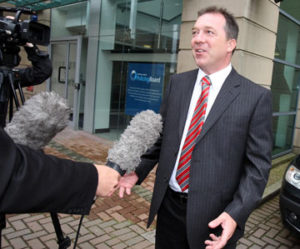Il nuovo comandante della polizia ha ricordato che la minaccia repubblicana non prenderà il sopravvento sul lavoro per la sicurezza

Ha affermato che, mentre i repubblicani sono un serio pericolo, non permetterà al problema di sviarlo dal combattere la pericolosa deriva intrapresa e di rendere più sicure le comunità.
Il nuovo comandante, 50 anni e padre di tre figli, è giunto alla guida della PSNI in un momento in cui il tasso di criminalità, fino ad ora in fase calante, ha avuto nuovamente uno scatto in avanti.
I bollettini statistici degli ultimi sei mesi forniscono un’arida testimonianza di ciò che è stato presentato ai membri del Board dalla vice comandante Judith Gillespie.
Il numero principale indica un incremento del 4,2% dei crimini complessivi in comparazione con lo stesso periodo dello scorso anno, con un significativo +21,9% nel più grave tipo di crimine violento, come omicidio, tentato omicidio, ferimenti e lesioni personali gravi.
Furti e altri reati sono ugualmente in crescita.
Gli incidenti stradali sono aumentati nell’ultimo anno, con 91 vittime.
Eccesso di burocrazia
Ha avvertito che i suoi agenti sono soffocati dall’eccesso di burocrazia.
Il successore di Orde ha affermato che è una tendenza del moderno sistema di polizia, valutare la prestazione in base alla quantità di documenti prodotti dagli agenti.
“Penso la burocrazia possa essere una coperta molto confortevole”, ha detto l’ex comandante della polizia di Leicestershire.
“Puoi mostrare i risultati riempiendo bene un modulo, ma ciò non significa necessariamente fare le cose che contano”.
La sua valutazione giunge a poche settimane dopo la scoperta di un rapporto interno sulla PSNI dove si leggeva che il servizio di polizia viene soffocato da moduli e documenti, con il 61% del tempo di ogno agente trascorso all’interno delle stazioni invece che sulle strade.
Il documento Strategic Review 2009 ha detto che una burocratica “cultura basata sulla conformità” interna alla PSNI ha intaccato la capacità di lavorare per la popolazione.
Avvertendo della “tirannia dell’eccessiva burocrazia”, Baggott ha riferito ai membri del Board di cercare di dare ai propri agenti più tempo e discrezione per fare il proprio lavoro.
Ha proseguito, affermando che un po’ di burocrazia è necessaria per rendere responsabile il servizio, ma ha aggiunto che quando diventa dilagante può intralciare la polizia.
“Ho visto molti, troppi colleghi nei miei anni di servizio che sono stati improvvisamente liberati dal giogo della burocrazia, ritrovare di colpo la loro passione e impegno per il servizio di polizia”.
Mercoledì sera è emersa la voltontà del governo di fornire alla PSNI nuovi poteri per combattere la criminalità di basso livello senza necessità di produrre molti documenti.
Tratto da Utv
Baggott won’t be ‘sidetracked by threat’
Northern Ireland’s new Chief Constable has stressed that he will not let the dissident threat take the focus of policing work here.
He said that, while dissidents pose a serious danger, he won’t allow the issue to sidetrack him from dealing with dangerous driving and making communities safer.
The 50-year-old father-of-three has arrived in the job at a time when downward crime rates have suddenly been jolting upward again.
The latest six monthly statistical bulletin provided stark evidence of that as it was presented to board members by Deputy Chief Constable Judith Gillespie.
Headline figures show a 4.2% rise in overall crime compared to the same period last year, with a significant 21.9% spike in the most serious types of violent crime, such as murder, attempted murder, wounding and GBH.
Burglaries and other acquisitive offences are also up.
Road fatalities are also on the increase on last year, with 91 people having lost their lives so far this year.
‘Red tape’
He warned that his officers were being stifled by red tape and excessive bureaucracy.
Sir Hugh Orde’s successor said there was a tendency within modern policing to judge performance by the amount of paperwork officers produced.
“I think bureaucracy can be a very helpful comfort blanket,” said the former Leicestershire chief.
“You can show success by filling in a form well, that doesn’t necessarily mean you are doing the things that matter.”
His assessment comes only weeks after a leaked internal report on the PSNI claimed that the service is being choked with forms and paperwork, with 61% of officers’ time spent inside stations rather than on the streets.
The Strategic Review 2009 document said a bureaucratic “compliance-based culture” within the PSNI had blunted its ability to serve the public.
Warning of the “tyranny of too much red tape”, Mr Baggott told board members he would strive to give his officers more time and discretion to do their job.
He said some level of bureaucracy was necessary to make the service accountable, but added that when it became pervasive it could hinder the police.
He added: “I have seen many, many colleagues in my years of service who have suddenly been liberated from the tyranny of too much red tape suddenly rediscover their passion and commitment for policing.”
On Wednesday night it emerged that the government has agreed to give the PSNI new powers to deal with low level crime without the need for extensive paperwork.